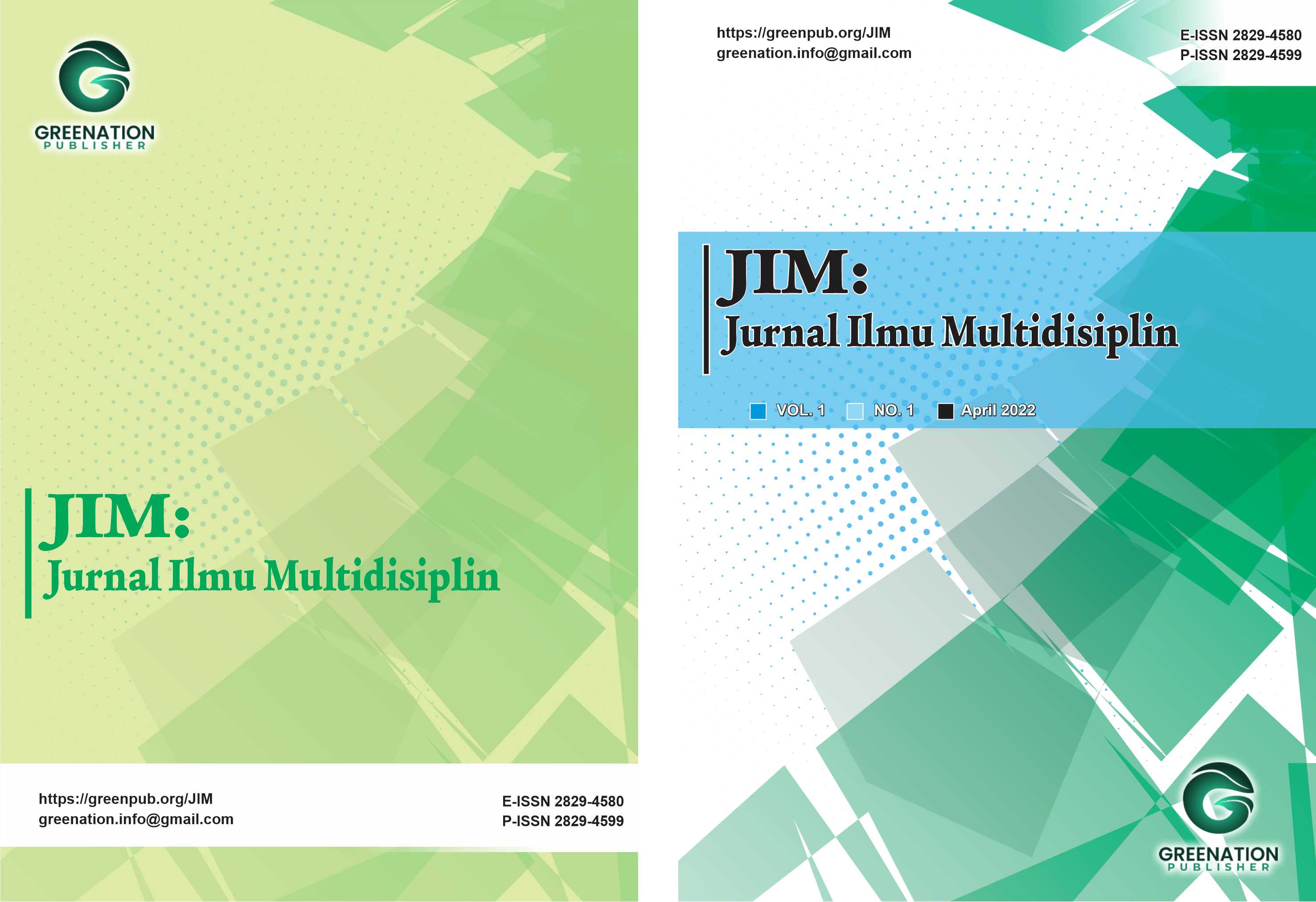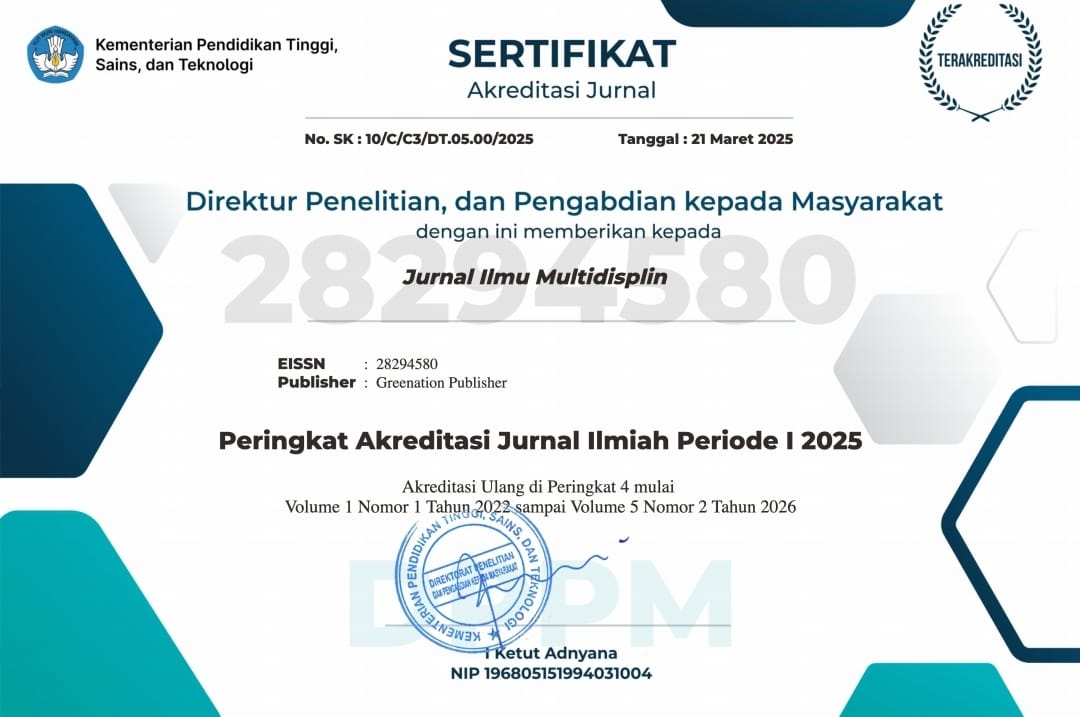Hubungan Transformational Leadership pada Innovative Working Behavior Dimediasi oleh Budaya Organisasi pada Usaha Kecil dan Menengah (UKM) Indonesia
DOI:
https://doi.org/10.38035/jim.v4i3.1142Keywords:
Kepemimpinan Transformasional, Innovative Work Behavior, UKM, Budaya OrganisasiAbstract
Memiliki kemampuan untuk berinovasi menjadi tujuan penting untuk bisnis usaha kecil dan menengah (UKM) untuk mampu berkompetisi dengan pasar yang berubah dengan cepat serta menaikkan derajat usaha menjadi lebih tinggi lagi. Perilaku kerja yang inovatif kemudian menjadi penting untuk ditumbuhkan demi mencapai tujuan tersebut, dan kepemimpinan transformasional menjadi salah satu faktornya. Karena inkonsistensi hubungan kedua variabel dari studi sebelumnya, maka budaya organisasi dipilih sebagai mediator berdasarkan kerangka teori dari social exchange theory (SET). Pengukuran akan dilakukan menggunakan PROCESS Hayes model 4 (parallel multiple mediation) dengan metode sampling yang digunakan adalah convenience sampling dengan pekerja UKM dan memiliki pemimpin di tempat kerja. Hasil penelitian adalah kepemimpinan transformasional dimediasi oleh budaya adhokrasi, budaya klan, dan budaya pasar untuk menghasilkan perilaku kerja inovatif (B = 1.5148, SE = 0.2282, p < 0.001, standardize effect = 0.4405, dan CI 95% [1.0645, 1.9651]. Penelitian ini berkontribusi pada teori social exchange theory beserta pebisnis UKM Indonesia.
References
AlEssa, H. S., & Durugbo, C. M. (2022). Systematic review of innovative work behavior concepts and contributions. Management Review Quarterly, 72(4), 1171–1208. https://doi.org/10.1007/s11301-021-00224-x
Andika Sayang Bati, F., & Ekowati, D. (2024). The Influence of Knowledge-Oriented Leadership on Innovative Work Behavior in SMEs with Knowledge Sharing as a Mediator. Eduvest-Journal of Universal Studies, 4(4), 2025–2039. http://eduvest.greenvest.co.id
Anning-Dorson, T. (2016). ORGANISATIONAL CULTURE and LEADERSHIP AS MEDIATORS of SERVICE INNOVATION and FIRM COMPETITIVENESS: A STUDY of AN EMERGING ECONOMY. International Journal of Innovation Management, 20(7). https://doi.org/10.1142/S136391961650064X
Aprilianty, E. P., & Waskito, J. (2023). Ethical leadership, adhocratic culture, and innovative work behavior: Drivers of company performance. Journal of Enterprise and Development (JED), 5(3), 2023.
Arsawan, I. W. E., Rajiani, I., Wirga, I. W., & Suryantini, N. P. S. (2020). Harnessing knowledge sharing practice to enhance innovative work behavior: The paradox of social exchange theory. Polish Journal of Management Studies, 21(2), 60–73. https://doi.org/10.17512/pjms.2020.21.2.05
Azeem, M., Ahmed, M., Haider, S., & Sajjad, M. (2021). Expanding competitive advantage through organizational culture, knowledge sharing and organizational innovation. Technology in Society, 66. https://doi.org/10.1016/j.techsoc.2021.101635
Bandura, A. (1978). Self-efficacy: Toward a unifying theory of behavioral change. Advances in Behaviour Research and Therapy, 1(4), 139–161. https://doi.org/https://doi.org/10.1016/0146-6402(78)90002-4
Bass, B. M. (1985). Leadership and Performance Beyond Expectations. Free Press. https://books.google.co.id/books?id=NCd-QgAACAAJ
BASS, B. M., & AVOLIO, B. J. (1993). TRANSFORMATIONAL LEADERSHIP AND ORGANIZATIONAL CULTURE. Public Administration Quarterly, 17(1), 112–121. http://www.jstor.org/stable/40862298
Bass, B. M., & Riggio, R. E. (2006). Transformational Leadership. In Transformational leadership, 2nd ed. (2nd ed.). Lawrence Erlbaum Associates Publishers. https://doi.org/10.4324/9781410617095
Brant, J. M., Haas-Haseman, M. L., Wei, S. H., Wickham, R., & Ponto, J. (2015). Understanding and Evaluating Survey Research.
Burns, J. M. (1978). Leadership (Vol. 697). Harper & Row. https://books.google.co.id/books?id=DeztAAAAMAAJ
Cameron, K. S., & Quinn, R. E. (1999). DIAGNOSING AND CHANGING ORGANIZATIONAL CULTURE based on The Competing Values Framework. In Copyright: Upper Saddle River. Prentice Hall Series in Organizational Development.
Chin, W. W. (1998). The partial least squares approach for structural equation modeling. In Modern methods for business research. (pp. 295–336). Lawrence Erlbaum Associates Publishers.
Danarratoe Kharima, K., Yulianti, P., & Kusyeni, R. D. (2023). A Systematic Literature Review?: Antecedents, Concepts and Research Sector of Innovative Work Behavior. In Majalah Ilmiah Bijak (Vol. 20, Issue 2). http://ojs.stiami.ac.id
Ekmekcioglu, E. B., & Öner, K. (2024). Servant leadership, innovative work behavior and innovative organizational culture: the mediating role of perceived organizational support. European Journal of Management and Business Economics, 33(3), 272–288. https://doi.org/10.1108/EJMBE-08-2022-0251
Etikariena, A., & Muluk, H. (2014). Correlation between Organizational Memory and Innovative Work Behavior. Makara Human Behavior Studies in Asia, 18(2), 77. https://doi.org/10.7454/mssh.v18i2.3463
Farida, I., & Setiawan, D. (2022). Business Strategies and Competitive Advantage: The Role of Performance and Innovation. Journal of Open Innovation: Technology, Market, and Complexity, 8(3). https://doi.org/10.3390/joitmc8030163
Ha, H. D., & Hang, H. T. T. (2024). The Impact of Transformational Leadership on Employee Performance in The Vietnamese Banking Industry. Journal of Organizational Behavior Research, 9(2), 12–27. https://doi.org/10.51847/8COZGxs9s6
Halawa, F., Sridadi, A. R., Hardiana, Y., Sundari, A., Zain, I. A. S., & Ramadhan, M. N. (2023). The Importance of Innovative Work Behavior in Era Industrial Revolution 4.0. Jurnal Maksipreneur: Manajemen, Koperasi, Dan Entrepreneurship, 13(1), 38. https://doi.org/10.30588/jmp.v13i1.1493
Hidayah, N., & Rodhiah, R. (2024). The Influence of Entrepreneurial Leadership, Self-Efficacy on Innovative Work Behavior of SMEs in Tangerang. International Journal of Social Science Research and Review, 7(3), 20–27. https://doi.org/10.47814/ijssrr.v7i3.1993
Janssen, O. (2000). Job demands, perceptions of effort-reward fairness and innovative work behaviour. Journal of Occupational and Organizational Psychology, 73, 287–302. https://www.proquest.com/scholarly-journals/job-demands-perceptions-effort-reward-fairness/docview/199295318/se-2?accountid=17242
Khan, H., Rehmat, M., Butt, T. H., Farooqi, S., & Asim, J. (2020). Impact of transformational leadership on work performance, burnout and social loafing: a mediation model. Future Business Journal, 6(1). https://doi.org/10.1186/s43093-020-00043-8
Khan, J., Jaafar, M., Mubarak, N., & Khan, A. K. (2024). Employee mindfulness, innovative work behaviour, and IT project success: the role of inclusive leadership. Information Technology and Management, 25(2), 145–159. https://doi.org/10.1007/s10799-022-00369-5
K?l?nç, A. Ç., Polatcan, M., Sava?, G., & Er, E. (2024). How transformational leadership influences teachers’ commitment and innovative practices: Understanding the moderating role of trust in principal. Educational Management Administration and Leadership, 52(2), 455–474. https://doi.org/10.1177/17411432221082803
Kwartawaty, N. N., Ismail, M. H., & Martadi, N. S. D. (2024). Most Effective Leadership Styles for Generation Z: A Review. Formosa Journal of Multidisciplinary Research, 3(9), 3321–3338. https://doi.org/10.55927/fjmr.v3i9.11009
Manir Hossin, M., Shah Azam, M., & Shamim Hossain, M. (2023). Asian Journal of Management Entrepreneurship and Social Science Leadership In SMEs: A Review Of Different Leadership Styles And Their Relevance To Management. https://ajmesc.com/index.php/ajmesc
Marampa, A. M., Garnasih, R. L., & Pariyanti, E. (2024). How to unleash innovative work behavior of SMEs workers through clan culture? “Testing the mediating role of knowledge sharing.” Industrial and Commercial Training, 56(1), 1–23. https://doi.org/10.1108/ICT-03-2023-0016
McColl-Kennedy, J., & Anderson, R. (2002). Impact of Leadership Style and Emotions on Subordinate Performance. The Leadership Quarterly, 13, 545–559. https://doi.org/10.1016/S1048-9843(02)00143-1
Mochammad Bachtiar Affandie, & Sopiah. (2022). TRANSFORMATIONAL LEADERSHIP: A LITERATURE REVIEW. JEMBA: JURNAL EKONOMI, MANAJEMEN, BISNIS DAN AKUNTANSI, 1(3), 345–360. https://www.bajangjournal.com/index.php/JEMBA/article/view/2208
Nguyen, N. P., Hang, N. T. T., Hiep, N., & Flynn, O. (2023). Does transformational leadership influence organisational culture and organisational performance: Empirical evidence from an emerging country. IIMB Management Review, 35(4), 382–392. https://doi.org/10.1016/j.iimb.2023.10.001
Oluwatosin Abdul-Azeez, Alexsandra Ogadimma Ihechere, & Courage Idemudia. (2024). Transformational leadership in SMEs: Driving innovation, employee engagement, and business success. World Journal of Advanced Research and Reviews, 22(3), 1894–1905. https://doi.org/10.30574/wjarr.2024.22.3.1888
Peerzadah, S. A. (2024). CREATIVITY IN R&D LABORATORIES: THE ROLE OF TRANSFORMATIONAL LEADERSHIP AND PSYCHOLOGICAL EMPOWERMENT. International Journal of Innovation Management, 28(3–4). https://doi.org/10.1142/S1363919624500178
Permana, I., Chochole, T., Hamdani, N. A., & Sari, R. P. (2023). INNOVATION DEVELOPMENT OF SMALL BUSINESS IN INDONESIA. Journal of Eastern European and Central Asian Research, 10(6), 888–899. https://doi.org/10.15549/jeecar.v10i6.1511
Pham, T. P. T., Van Nguyen, T., Van Nguyen, P., & Ahmed, Z. U. (2024). The pathways to innovative work behavior and job performance: Exploring the role of public service motivation, transformational leadership, and person-organization fit in Vietnam’s public sector. Journal of Open Innovation: Technology, Market, and Complexity, 10(3). https://doi.org/10.1016/j.joitmc.2024.100315
Schein, E. H. (2006). Organizational Culture and Leadership. Wiley. https://books.google.co.id/books?id=xhmezDokfnYC
Schein, E. H., & Schein, P. A. (2016). Organizational Culture and Leadership. Wiley. https://books.google.co.id/books?id=l2jpCgAAQBAJ
Shatila, K., Agyei, F. B., & Aloulou, W. J. (2024). Impact of transformational leadership on leadership effectiveness: the mediating effect of emotional skills in the Lebanese small and medium-sized enterprises context. Journal of Enterprising Communities: People and Places in the Global Economy, 18(4), 857–878. https://doi.org/10.1108/JEC-09-2023-0174
Siswanti, Y., Salsabil, I., & Muafi, M. (2024). Organizational Culture and Its Consequences for Social Capital, Human Capital, and Innovative Behavior: Cross-Level Analysis. Review of Integrative Business and Economics Research, 13(2), 314–331. https://www.proquest.com/scholarly-journals/organizational-culture-consequences-social/docview/2886391428/se-2?accountid=17242
Sode, R., & Chenji, K. (2024). The mediating role of workplace spirituality: Exploring the relationship between, self-transcendence, spiritual transcendence, and innovative work behavior. Acta Psychologica, 245. https://doi.org/10.1016/j.actpsy.2024.104228
Tadesse Bogale, A., & Debela, K. L. (2024). Organizational culture: a systematic review. Cogent Business & Management, 11(1), 2340129. https://doi.org/10.1080/23311975.2024.2340129
Vo, A. H. K., Nguyen, T.-D., Le, Y.-N., Cao, H. N. Q., Le, V. N. T., & Huynh, K.-L. (2024). Is transformational leadership always good for innovation? The moderating effect of transformational leadership on the personality–innovativeness link through knowledge sharing. International Journal of Organizational Analysis, 32(1), 131–152. https://doi.org/10.1108/IJOA-10-2022-3444
Xie, Y., Gu, D., Liang, C., Zhao, S., & Ma, Y. (2020). How transformational leadership and clan culture influence nursing staff’s willingness to stay. Journal of Nursing Management, 28(7), 1515–1524. https://doi.org/10.1111/jonm.13092
Downloads
Published
How to Cite
Issue
Section
License
Copyright (c) 2025 Aisha Nuraini Sengkananingrum, Alice Salendu, Billah Ahsanul Karima

This work is licensed under a Creative Commons Attribution 4.0 International License.
You are free to:
- Share— copy and redistribute the material in any medium or format
- Adapt— remix, transform, and build upon the material for any purpose, even commercially.
The licensor cannot revoke these freedoms as long as you follow the license terms.
Under the following terms:
- Attribution— You must give appropriate credit, provide a link to the license, and indicate if changes were made. You may do so in any reasonable manner, but not in any way that suggests the licensor endorses you or your use.
- No additional restrictions— You may not apply legal terms or technological measures that legally restrict others from doing anything the license permits.
Notices:
- You do not have to comply with the license for elements of the material in the public domain or where your use is permitted by an applicable exception or limitation.
- No warranties are given. The license may not give you all of the permissions necessary for your intended use. For example, other rights such as publicity, privacy, or moral rightsmay limit how you use the material.



























